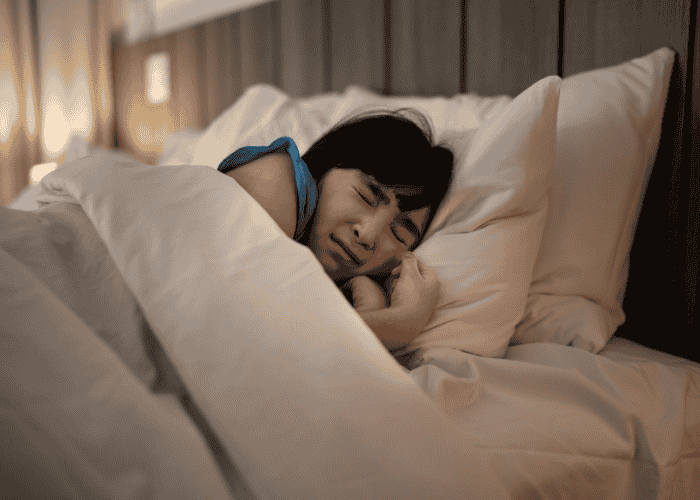Teen Nightmares: Causes, Emotional Impact, and Coping

Published: 10/30/2025 | Updated: 10/30/2025
Authored by: Emma Loker, BSc, PgDip
Edited by: Jemma Strain, B.S. Psychology
If you or your teen experiences nightmares, we don’t have to tell you how distressing they can be. Nightmares can disrupt your sleep, make it difficult to get back to sleep, and leave you feeling upset, on edge, or confused. They often spark intense negative emotions that can last well past the time your alarm clock goes off the next morning. In fact, experts often say that nightmares are undertreated and that they should be taken seriously.1,4
Further, teen nightmares can contribute to or be caused by conditions like anxiety and depression. Without treatment, conditions like these can worsen, further impacting academic performance and friendships and leaving teens feeling both exhausted and afraid to go to sleep at night.
If you’re concerned about depression- or anxiety-related nightmares in your teen, a mental health professional can advise on the root causes and options for treatment. This page can also help you better understand teen nightmares, as it explores:
The causes of teen nightmares- Potential impacts of teen nightmares
- Coping strategies for nightmares
- Early intervention options
- Where to find professional support

Teen Nightmares: What Are the Causes?
Experts have identified a number of factors that are linked to teen nightmares.1,5 Some of these factors are stress, anxiety, trauma, depression, ruminating thoughts, environmental factors, and exposure to violent or distressing media content.
It is believed that our daytime experiences, especially stressful ones, can impact brain activity and affect dreams.1 Below, we discuss some influences on our daytime experiences that can become common nightmare triggers. These include mental health conditions, individual traits and characteristics, environmental factors, and biology.
Stress
It is common to experience high amounts of stress during the teen years. For instance, pressure to perform well in school and extracurriculars, worries about the future, and conflict with (or between) parents are just some of the common stressors that can impact adolescents. So, it makes sense that teens may be at higher risk of stress-related nightmares.
Stress can take a toll on the mind and body in a variety of ways. In fact, studies show that high levels of stress can increase arousal during sleep, which could lead to nightmares.1
Further, research shows that stressful life events, such as starting a new school, applying to colleges, or experiencing relationship problems, can prompt intense dreams that play out these major events.1
Anxiety-Related Nightmares
Anxiety is common among adolescents, and, according to professionals, is a leading contributor to nightmares. Further, anxiety-related nightmares in teens can be more frequent and more intense than in teens without anxiety.1 This may be because daytime worries and concerns bleed into the sleeping hours, manifesting as unpleasant dreams.
People with anxiety may also be prone to experiencing ruminating thoughts at bedtime. Ruminating thoughts are cognitive patterns in which someone may focus on negative experiences, such as mistakes they believe they made, moments of failure or embarrassment, and anxieties. These types of thought patterns can affect brain activity while you sleep and increase the likelihood and intensity of nightmares.1
Depression
Like anxiety, depression can prompt a person to ruminate on negative events or possibilities at bedtime. Additionally, depression can change the way that a person progresses through different cycles of sleep throughout the night. Depression may also increase REM sleep – the stage of sleep in which we dream. These changes in “sleep architecture” can lead to increased nightmare frequency.1
Trauma and PTSD
Traumatic events may replay through recurrent nightmares. This is often due to how the brain attempts to process a difficult experience, but struggles to do so. Therefore, it attempts to find other ways to integrate the trauma. As a result, people with PTSD are more likely to experience recurrent nightmares that are vivid, distressing, and disruptive to the person’s sleep.1
Environmental Factors
As a person experiences heightened stress, their brain shows increased arousal during sleep.1 This, in turn, can leave the person more vulnerable to nightmares.1 Examples of environmental stressors can include instability at home, family conflict, and exposure to upsetting, violent, or graphic media content. These environmental factors have been linked to nightmares.1
Biological and Genetic Factors
Studies suggest that there may be a genetic component to nightmares. For instance, research has shown that people with a family history of nightmares are more likely to experience nightmares.1 Furthermore, anxiety and mood disorders are often linked to genetic factors, and these conditions appear to be strongly linked to nightmares.1
Emotional Impact of Teen Nightmares
The emotional impact of nightmares cannot be overstated. Research shows that nightmares can have a severe adverse effect on teens’ quality of life. Therefore, recurring teen nightmares should not be ignored or dismissed.1
Here are some critical ways that nightmares can harm teens’ well-being:1
Elevated levels of anxiety- Increased levels of depression
- Heightened risk for developing other mental health disorders
- Disrupted sleep cycles, leading to poor sleep quality and quantity
- Daytime sleepiness and irritability
- Reduced daytime concentration, memory, and emotional regulation by impacting sleep
- Increased school absenteeism
- Heightened anxiety symptoms during sleep, which can linger when awake
- Fear of sleep, which is linked to risk of depression, anxiety, paranoia, and hallucinations2
- Increased risk for PTSD3
- Elevated risk of suicidal thoughts3
With such significant risks to teens’ overall mental and physical health, treating nightmares should be considered an essential component of promoting teen wellness and mental health. Fortunately, mental health professionals have found that coping strategies and, particularly, early intervention for sleep disturbances, can effectively minimize nightmares in adolescents.
Coping Strategies for Teens Experiencing Nightmares
If nightmares are preventing you or your teen from getting a good night’s sleep, there is hope. Several professional treatment options have been scientifically shown to effectively reduce nightmare frequency. Coping strategies for teens experiencing nightmares and disturbing dreams may also be helpful for promoting restful sleep.
These coping strategies for teens include:
Taking steps to improve sleep hygiene: Sleep hygiene involves intentionally supporting healthy sleep patterns. For instance, practices such as maintaining a consistent bedtime routine, minimizing stress triggers in the bedroom, and creating a safe and secure sleeping space may help reduce nightmares.1 These actions can help reduce anxiety and uncertainty around sleep, which may reduce nightmares.- Learning and practicing relaxation techniques for teens: Relaxation techniques can help you manage stress and anxiety, which can trigger nightmares. For example, journaling, progressive muscle relaxation, and deep breathing are just a few steps you can take to unwind and manage stress and anxiety.
- Asking for support: You don’t have to manage your nightmares by yourself. Parental support for nightmares can be valuable. First, you could ask your parents to support you by reassuring you when you have a distressing dream.1 Second, if your nightmares do not subside, your parents can help you connect with a professional for treatment. Effective treatment options exist for reducing nightmares and their impact on your life.
While these coping strategies can help, sometimes nightmares resulting from mental health issues can be too challenging to manage at home. If this is the case for you, professional support can help.
Early Intervention for Teen Nightmares
Nightmares can have severe consequences for teens’ mental health. As mentioned, they can worsen mental health conditions like anxiety, depression, and PTSD, lead to sleep deprivation, and even increase the risk of suicide.
If nightmares are causing you or your child distress, know that effective treatment options are available. Some evidence-based treatments for nightmares include:
Cognitive behavioral therapy: One important treatment option for nightmares is cognitive behavioral therapy (CBT). Research shows that CBT is effective for reducing the frequency and severity of nightmares and that improvements are long-lasting.1 Plus, CBT also involves helping people reframe the way they think about nightmares to reduce the distress caused by bad dreams.- Image rehearsal therapy: Another leading treatment option for teen nightmares is Image rehearsal therapy (IRT). This therapy option is also effective for achieving long-lasting improvements in nightmare frequency and severity. Sessions involve recalling nightmares while awake and visualizing a positive ending.
- Managing underlying mental health problems: Since nightmares and disorders such as anxiety and depression are strongly linked, treating these conditions or managing stress may also reduce nightmares. For example, studies have shown that treating PTSD is effective for managing PTSD-related nightmares.2 This could be done through trauma-informed approaches such as Eye Movement Desensitization and Reprocessing (EMDR).
- Pharmacological interventions: Extensive research shows that certain medications can be effective in treating nightmares. For instance, two pharmacological interventions for nightmares include medications called “prazosin” and “nitrazepam.”3 However, medications often work best alongside talk therapies, especially when mental health conditions are present.

Mission Prep: Professional Support for Teen Nightmares
Nightmares can take a serious toll on a teen’s mental and physical health, putting them at risk for long-term complications. However, they don’t have to. Effective, science-backed treatment options can help your child experience fewer, less intense nightmares.
Everyone should have the freedom to climb into bed with the confidence that they will sleep peacefully and wake in the morning feeling refreshed. With scientifically studied treatment methods ranging from medications to cognitive behavioral therapy and image rehearsal therapy, this can be the case for your child.
At Mission Prep, we stress the importance of personalizing treatment to fit the client and their unique needs.3 Our team is committed to starting with a comprehensive evaluation. After gaining a clear understanding of what you’re going through, we will work with you to create a tailored plan to help you meet your treatment goals.
The first step on the path to overcoming nightmares is reaching out to our team. We are available 24/7 to answer any questions or concerns you may have, starting the process of restoring peaceful and restful sleep.
References
- Sahu, N., Patil, P. S., Asmita, & Longkumer, I. (2024). Understanding and Treating Nightmares: A Comprehensive review of psychosocial strategies for adults and children. Cureus. https://doi.org/10.7759/cureus.70044
- Sheaves, B., Rek, S., & Freeman, D. (2022). Nightmares and psychiatric symptoms: A
systematic review of longitudinal, experimental, and clinical trial studies. Clinical Psychology Review, 100, 102241. https://doi.org/10.1016/j.cpr.2022.102241
- Gill, P., Fraser, E., Tran, T. T. D., De Sena Collier, G., Jago, A., Losinno, J., & Ganci, M. (2023). Psychosocial treatments for nightmares in adults and children: a systematic review. BMC Psychiatry, 23(1). https://doi.org/10.1186/s12888-023-04703-1
- Nadorff, M. R., Nadorff, D. K., & Germain, A. (2015). Nightmares: Under-Reported, undetected, and therefore untreated. Journal of Clinical Sleep Medicine, 11(07)747–750. https://doi.org/10.5664/jcsm.4850
- Tanaka, Y., Otsuka, Y., Nakajima, S., Itani, O., Miyoshi, T., & Kaneita, Y. (2025). Association between dreams, anxiety, and depressive symptoms among Japanese adolescents: a Cross-Sectional study. Clocks & Sleep, 7(3), 34. https://doi.org/10.3390/clockssleep7030034













